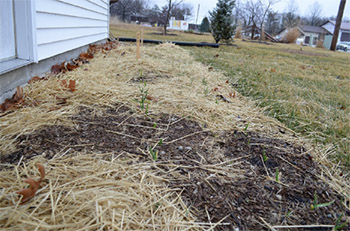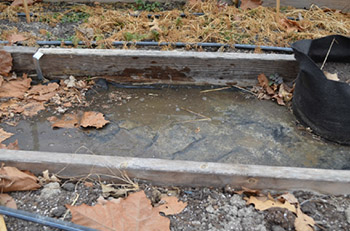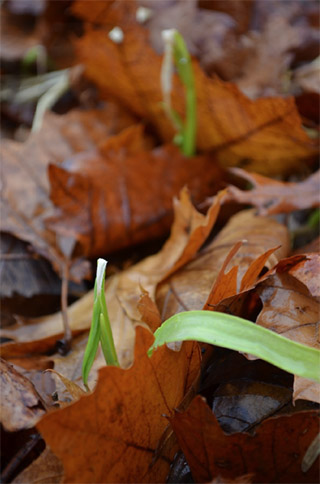Address any questions or comments regarding this newsletter to the individual authors listed after each article or to its editors, Nathan Johanning, 618-939-3434, njohann@illinois.edu or Bronwyn Aly 618-695-6060, baly@illinois.edu. The Illinois Fruit and Vegetable News is available on the web at: http://ipm.illinois.edu/ifvn/. To receive or be removed from email notification of new postings of this newsletter, contact Nathan Johanning or Bronwyn Aly at the phone numbers or email addresses above.
In This Issue:
Upcoming Programs (listings for beginning and established growers)
News and Announcements (Presentations available online from Illinois Specialty Crops, Agritourism, & Organic Conference and Gateway Small Fruit & Vegetable Conference)
Regional Reports (west central, southern Illinois, Dixon Springs)
Fruit and Vegetable Production and Pest Management (Dicamba - Are Your Sensitive Crops Acres Registered, 2017 Indiana Watermelon Variety Trial)
Upcoming Programs
Check the Illinois SARE calendar for a full list of programs and links for registration.
http://illinoissare.org/ and http://illinoissare.org/calendar.php
Also see the University of Illinois Extension Local Food Systems and Small Farms Team's website at:
http://web.extension.illinois.edu/smallfarm/ and the calendar of events at http://web.extension.illinois.edu/units/calendar.cfm?UnitID=629.
- Small Farms Winter Webinar Series, Thursdays, Starting January 25 through April 5, 2018, Noon to 1 p.m. Visit http://go.aces.illinois.edu/WinterWebinars to register or see the topics for this program. Also see the "News & Announcements" below for more details in the newsletter. For more information contact Zack Grant at 708-679-6889 or zgrant2@illinois.edu. To view previous, archived webinars visit : http://bit.ly/ILLocalFoodsYouTube
2018 Small Farms Winter Webinar Schedule- Mar. 1 - Heavy metals in soils: identifying and acting on contamination, Dr. Andrew Margenot, University of Illinois Department of Crop Sciences, College of ACES
- Mar. 8 - Native Pollinators on your Farm, Doug Gucker, University of Illinois Extension Local Food Systems and Small Farms Educator
- Mar. 15 – Small Acres Pastured Poultry, James Theuri, University of Illinois Extension Local Food Systems and Small Farms Educator
- Mar. 22 - Growing Ginger, Turmeric, and Other Unique Crops, Chris Enroth, University of Illinois Extension Horticulture Educator
- Mar. 29 - Tips for Modifying and Building Sprayers for Specialty Crops, Nathan Johanning, University of Illinois Extension Local Food Systems and Small Farms Educator
- April 5 - Less Common Fruit Bearing Plants, Elizabeth Wahle, University of Illinois Extension Commercial Ag Educator (Fruits and Vegetables)
- Winter High Tunnel Workshop, Saturday, February 24, 2018, 10 a.m. Jackson County Extension Office High Tunnel, 402 Ava Rd., Murphysboro, IL 62966. This in tunnel program will discuss current research and techniques for overwintering crops and year round production. To register or for more details visit: https://web.extension.illinois.edu/registration/?RegistrationID=17891 or call 618-687-1727.
- Annie's Project – Education for Farm Women Tuesday evenings starting March 6 and ending on April 10, 5:50 to 8:50 p.m., at the Farm Credit Illinois building in Jerseyville, 27049 IL-16, Jerseyville. Online registration is available at http://go.illinois.edu/AnniesProjectJersey. For more information, contact Andrew Holsinger at aholsing@illinois.edu or 217-532-3941. Also visit the Annie's Project website at www.AnniesProject.org.
- Greenhouse Tomato Short Course, March 6 & 7, 2018 at Eagle Ridge Conference Center, Raymond, Mississippi. For more information and online registration - http://greenhousetomatosc.com or contact Rick Snyder at Rick.Snyder@msstate.edu or 601-892-3731
- 2018 Illinois Summer Horticulture Field Day, Thursday, June 7, 2018. Annual Illinois State Horticulture Society annual summer field day will by hosted by Flamm's Orchard in Alto Pass, IL. Save the date; more details closer to event.
- 2018 Pumpkin Field Day, Thursday, September 6, 2018, 10 a.m. Ewing Demonstration Center (located about 20 minutes south of Mt. Vernon, IL) 16132 N. Ewing Rd. Ewing, IL 62836. Pumpkin Variety & Pest Management trials, No-till Production and more! Save the date; more details to come! For additional information contact Nathan Johanning at 618-687-1727 or njohann@illinois.edu.
News and Announcements
Presentations available online from Illinois Specialty Crops, Agritourism, & Organic Conference and Gateway Small Fruit & Vegetable Conference
If you missed out on sessions at either Illinois Specialty Crops, Agritourism, & Organic Conference or the Gateway Small Fruit & Vegetable Conference, PDF copies of most all of the presentations from these recent meetings are available. We have brought together a wealth of knowledge at our conferences from not only this year, but previous years, so make use of these resources from those presentations!
2018 Illinois Specialty Crops, Agritourism, & Organic Conference Presentations, Springfield, IL:
http://www.specialtygrowers.org/conference-2018-speaker-presentations.html
2018 Gateway Small Fruit & Vegetable Conference Presentations, O'Fallon, IL
http://web.extension.illinois.edu/mms/cropPresentations/5621.html
Regional Reports
From west central Illinois... Buckets of rain, is a good way to describe what we're getting in most of Illinois. Unfortunately, while the top two inches of soil are thawed, go deeper than four inches and the ground is still frozen. The frozen subsoil limits drainage on level ground. Due to the lack of topography onsite, our high tunnel has filled with water. I'm glad we had the foresight to build raised beds in the tunnel. In two days we've received 2.62 inches of rain on nearly frozen ground.
On November 4, 2017, we planted our garlic. It seems the mild temperatures through the end of December caused some aboveground growth that was knocked back once the cold temperatures arrived around Christmas. Pulling back our straw mulch I found rows of garlic with their tops hit by cold temperatures. I'm not terribly concerned about the cold damage. I am annoyed about the grass growing in our new beds of garlic. Though converting lawn to growing bed will make grass weeds an inevitable struggle for a few years. I'll focus mostly on using an organic mulch layer to suffocate the weeds and help build the post-construction soil in both our garlic beds.
Many growers have begun seeding tomatoes indoors for high tunnel production. I've started pre-sprouting ginger and turmeric in late January. Ginger can take four weeks to sprout, while turmeric may take over two months! We will be seeding our cool-season crops inside for field and high tunnel production, hopefully soon, as I am a bit behind on getting things started indoors.
|
|
|
Chris Enroth (309-837-3939; cenroth@illinois.edu)
From southern Illinois... The latter part of January was cold as earlier in the month, but the "extreme" cold pattern has broken and we are now into more "average" late winter temperatures, with some ups and downs with more highs around the 40s & 50s and lows in the 30s. We have also had some very warm days with a few days early this week with highs in the 70s, but that was short lived, although very pleasant. Most of this week has overall been very cloudy and rainy. In the Carbondale area we have had about 3", while at Dixon Springs we have had almost 4.5" this week. This is much needed rainfall to replenish our soil moisture and also to help build water levels in local lakes and reservoirs. Needless to say it is very muddy, as I can attest to spending some time working on our high tunnels at Dixon Springs.
Not a lot is going on out in the field given the weather, but still pruning in orchards and small fruit plantings and planning for the upcoming season. High tunnel crop growth has been fairly slow until the last week or so with the break in the cold. Even with some sunny days in the cold period and air temps easily in the 60s in the afternoon in tunnels, the soil is still slow to warm and with tunnel temps dropping into the 20s or teens at night that definitely slowed plant growth, especially on later plantings.
We have more rain and clouds in the forecast through the weekend, before the weather breaks for more some sunshine next week.
Nathan Johanning (618-939-3434; njohann@illinois.edu)
From Dixon Springs Agricultural Center... We are continuing to work to get the high tunnels at DSAC back into production. At this point, we are waiting for dryer weather to get French drains installed and are moving forward to get end walls framed up. We had a 4 hour break from the wind on Thursday and were able to get the new cover put on over the middle tunnel. Now, the raised beds inside this tunnel should start to dry up and allow us to add amendments, fill, and prep beds for planting. Requested seed donations are starting to arrive, and we are excited to start planting.
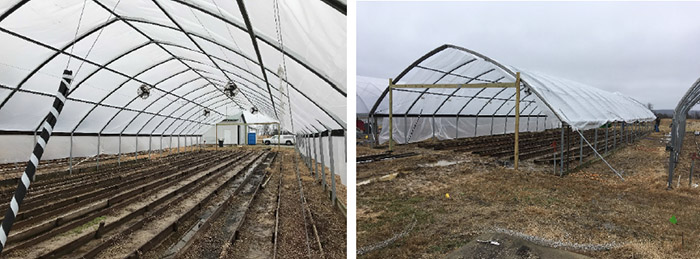
New cover and end wall structures on one of the high tunnels at the Dixon Springs Ag Center. Photos: B. Aly (left); N. Johanning (right)
Bronwyn Aly (618-382-2662; baly@illinois.edu)
Fruit and Vegetable Production and Pest Management
Dicamba - Are Your Sensitive Crops Acres Registered?
Last fall the USEPA made changes to the labels of the three dicamba herbicides (FeXapan®, XtendiMax®, or Engenia®) registered for use on dicamba-tolerant crops. The changes included several changes. First, these herbicides are now "Restricted Use Pesticides". Pesticide applicators are now required to take a special training on the proper application procedures use these products, and applicators are now required to check sensitive crops registries before spray Dicamba-tolerant crops (soybeans and cotton).
In Illinois, our sensitive crops registry is the DriftWatch/FieldWatch registry. It is in your best interest as a grower of crops sensitive to dicamba herbicides to take the time to make sure your fields are registered or that your registered fields are up to date.
Doug Gucker (217-877-6042; dgucker@illinois.edu)
Top Performing Watermelon Varieties in the 2017 Indiana Watermelon Variety Trial
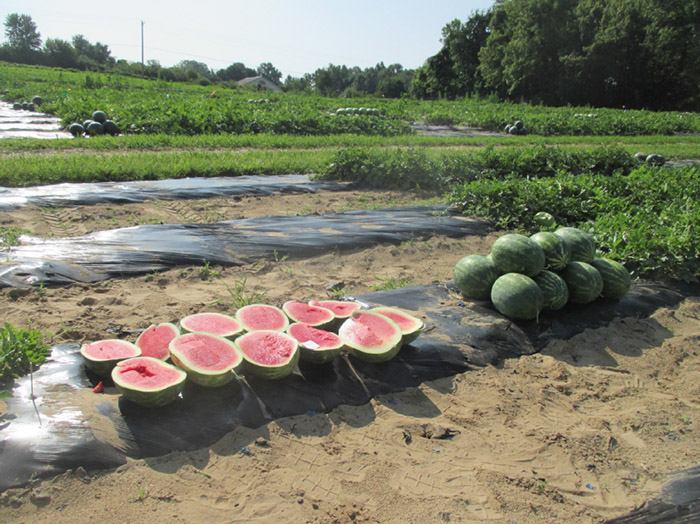
Seedless watermelon variety trials have been conducted at the Southwest Purdue Agricultural Center in Vincennes, IN for more than 20 years. In 2017, we evaluated the performance of 37 standard size seedless watermelon varieties and 4 mini watermelon varieties. This article introduces the top performing varieties in our trial in 2017.
Standard size seedless watermelons
Red Amber. This is a new variety. It had the highest yield among 37 varieties in 2017. Rind pattern of the variety is a medium green background with a medium dark crimson stripe. Average fruit weight in our trial was 16 lb. Red Amber had relatively firmer flesh compared with other varieties.
9651 and 9601. Both 9651 and 9601 are sugar baby type watermelons that have solid green rinds. Fruit shape is round to oval. Both varieties had a high yield in 2017, especially 9651. Average fruit size of 9651 was 16 lb and 9601 was 15 lb.
Warrior. It had consistently high yields in 2016 and 2017 variety trials, and it is a relatively early measuring variety in both years. Average fruit size of warrior was 16 lb. Warrior has crimson rind pattern.
Road trip and Joy Rind. Both varieties had high yields in 2017 variety trial. But their yields were relatively low in 2016, when a moderate Fusarium wilt disease pressure existed. Average fruit weight of Road trip was 15 lb and Joy Rind was 16 lb. Both varieties have light green crimson strip rind pattern. Road trip had a high sugar content in 2016 variety trial.
Kingman. It had a high yield in 2017 but moderate yield in 2016. Average fruit weight of Kingman was 15.5 lb. Kingman had a uniform fruit size with more than 60% fruit in 45 count category (13.6-17.5 lb).
Bottle Rocket. It had a high yield in 2017 variety trial. Average fruit weight was 16 lb. It had crimson rind pattern but with a darker color compared to other Seminis varieties.
Embasy. It had a high yield in 2017 variety trial. Average fruit weight was 16 lb. It had dark green crimson rind pattern. Embasy also had a relatively high yield in 2016.
Exclamation. It had relatively high yields in both 2016 and 2017 variety trials. Average fruit weight was 16 lb, with more than 30% fruit in 36 and 30 count categories (fruit weight larger than 17.6 lb). Exclamation was a relatively early maturing variety.
Personal (mini) size watermelons
Extazy. Four personal size watermelon varieties were tested in each of 2016 and 2017. Consistently, Extazy had the highest yield in both years. However, Extazy had about 10-20% fruit above 10 lb, which may prevent it from being marketed as personal (mini) size watermelons.
Detailed information about how we conducted the trial and the results can be downloaded from https://ag.purdue.edu/arge/swpap/Pages/SWPAPPDFPresentstions.aspx
We are currently accepting variety entries for the 2018 watermelon variety trial. If you are interested in entering varieties into the trial, please contact Wenjing Guan (guan40@purdue.edu, (812) 886-0198). Watermelon growers and company representatives are very welcome to visit the trial during the production season by making an appointment with Wenjing Guan.
Wenjing Guan, Clinical/Engagement Assistant Professor, Southwest Purdue Agricultural Center, Purdue University (812-886-0198; guan40@purdue.edu)
Less Seriously...
http://www.wiseoldsayings.com/farming-quotes/
"Farming looks mighty easy when your plow is a pencil and you're a thousand miles from the corn field."
-- Dwight D. Eisenhower
"It is thus with farming: if you do one thing late, you will be late in all your work."
-- Cato the Elder
"Agriculture is our wisest pursuit, because it will in the end contribute most to real wealth, good morals, and happiness."
-- Thomas Jefferson
"For of all gainful professions, nothing is better, nothing more pleasing, nothing more delightful, nothing better becomes a well-bred man than agriculture."
-- Marcus Tullius Cicero
"You can make a small fortune in farming-provided you start with a large one."
-- unknown
"Agriculture is the most healthful, most useful, and most noble employment of man."
-- George Washington
"If we estimate dignity by immediate usefulness, agriculture is undoubtedly the first and noblest science."
-- Samuel Johnson
"I'd always rather be lucky than good."
-- Jeff Kindhart
We got some of Jeff's luck this week when we hit a window of opportunity and got plastic on one of the high tunnels at DSAC. Thanks!
University of Illinois Extension Specialists in Fruit and Vegetable Production & Pest Management
Extension Educators – Local Food Systems and Small Farms |
||
Bronwyn Aly, Gallatin, Hamilton, Hardin, Pope, Saline, and White counties |
618-382-2662 |
|
Katie Bell, Franklin, Jackson, Perry, Randolph, & Williamson counties |
618-687-1727 |
|
Sarah Farley, Lake & McHenry counties |
847-223-8627 |
|
Nick Frillman, Woodford, Livingston, & McLean counties |
309-663-8306 |
|
Laurie George, Bond, Clinton, Jefferson, Marion, & Washington counties |
618-548-1446 |
|
Zachary Grant, Cook County | 708-679-6889 | |
Doug Gucker, DeWitt, Macon, and Piatt counties |
217-877-6042 |
|
Erin Harper, Champaign, Ford, Iroquois, and Vermillion counties |
217-333-7672 |
|
Grace Margherio, Jackie Joyner-Kersee Center, St. Clair County |
217-244-3547 |
|
Grant McCarty, Jo Daviess, Stephenson, and Winnebago counties |
815-235-4125 |
|
Katie Parker, Adams, Brown, Hancock, Pike and Schuyler counties |
217-223-8380 |
|
Kathryn Pereira, Cook County |
773-233-2900 |
|
James Theuri, Grundy, Kankakee, and Will counties |
815-933-8337 |
|
Extension Educators – Horticulture |
||
Chris Enroth, Henderson, Knox, McDonough, and Warren counties |
309-837-3939 |
|
Richard Hentschel, DuPage, Kane, and Kendall counties |
630-584-6166 |
|
Andrew Holsinger, Christian, Jersey, Macoupin, & Montgomery counties |
217-532-3941 |
|
Extension Educators - Commercial Agriculture |
||
Elizabeth Wahle, Fruit & Vegetable Production |
618-344-4230 |
|
Nathan Johanning, Madison, Monroe & St. Clair counties |
618-939-3434 |
|
Campus-based Extension Specialists |
||
Kacie Athey, Entomology |
217-244-9916 |
|
Mohammad Babadoost, Plant Pathology |
217-333-1523 |
|
